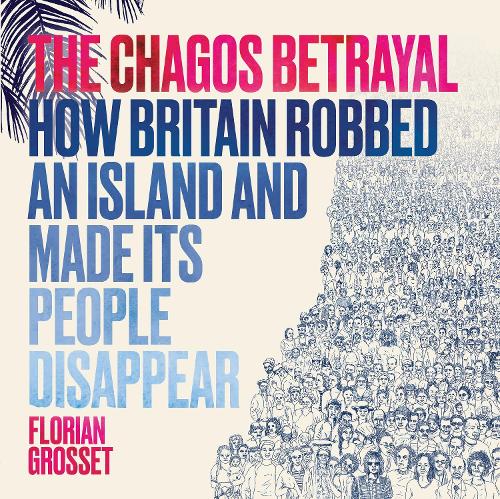
The Chagos Betrayal: How Britain Robbed an Island and Made Its People Disappear
(Paperback)
Publishing Details
The Chagos Betrayal: How Britain Robbed an Island and Made Its People Disappear
By (Author) Florian Grosset
Myriad Editions
Myriad Editions
15th July 2021
17th June 2021
United Kingdom
Classifications
General
Fiction
Refugees and political asylum
Political geography
741.5
Physical Properties
Paperback
112
Width 250mm, Height 250mm
Description
A shocking graphic novel tells the poverty and discrimination suffered by the Chagos Islanders when their eviction by the British enforced US military control of their Indian Ocean home.
During the cold war, the US government sought to establish an overseas military presence in the Indian Ocean. This graphic novel is a shocking account of British complicity in the forced exodus of the Chagos Islanders from their homeland to make that plan possible.
Between 1965 and 1973 the inhabitants of the Chagos archipelago were forcibly removed from their homeland and dumped in Mauritius and Seychelles. Diego Garcia, the largest island in the group, was leased to the USA by the United Kingdom to accommodate the largest US military air base outside the US mainland. The agreement continues until 2036.
Florian Grossets searing account of the eviction, and the harsh life faced by the Chagossians after their displacement, looks back to the first generation of slaves who arrived on the archipelago and the lives of their descendants. It charts the present-day diaspora of Chagossians, their fight for the right to return through protests and court cases, and the different strategies still being used to keep them away from their land. Although, in 2016, the British government denied the right of the Chagossians to return to the islands, the islanders continue to fight for the right to return, many of them now to a homeland they never knew. In February 2019, the International Court of Justice ruled that the UK decolonisation process of the Chagos islands was unlawful, and that the UK should end its control of the Indian Ocean archipelago, which includes a US military base.
Reviews
'Grosset progresses the story in period-specific vignettes, contrasting the monochromes of exile with the colourful past and finally the black-and-white monotone of the struggle for restitution from the British government.' Morning Star, Michal Boncza. 'Absolutely brilliant, a must readI implore everybody to read this book. Thank you SO much [Florian Grosset] for documenting so well such a devastating piece of history that deserves so much more attention.' Lucy Timmins on instagram @whatlucyreads. 'Florian Grosset tells a powerful story, and, with the wonderful illustrations, very beautifully. It is an important contribution, and deserves a wide readership.' Philippe Sands, QC, President of English PEN. 'A very creative way of telling of a terrible and ongoing atrocity. It is impossible to explore this book and not feel the injustice, and then feel that justice must be done.' Benjamin Zephaniah. 'Extraordinarily moving, almost haunting and powerfully factuala rallying cry to all of us to stand with the islanders until they receive the justice they have fought and died for. Every school, every library should have this book. Please read what was done in your name.' John Pilger. 'Vivid and captivating.' Allen Vincatassin, President, Diego Garcia & Chagos Islands Council. 'Very powerful. Its time for the UK government to return our islands.' Sabrina Jean, Chairperson, Chagos Refugees Group UK. 'A disturbing, infuriating accountall the more affecting for being delivered in a sober and careful way by Florian Grossets gentle pictures. Her measured recitation of the facts surrounding the dispossession of an entire people from their home is profoundly enraging.' Woodrow Phoenix. 'This is a fantastic graphic novel which powerfully illustrates the injustices the Chagossians have experienced through art and quiet detail.' Tom Frost, Leicester Law School. 'Florian Grosset meticulously depicts a shameful chapter of British colonialism, and reveals the obscenity of the oxymoronic phrase "British Indian Ocean Territory".' Kate Evans, author of Threads. 'Powerfully movingbeautifully and sensitively drawn. I loved the way it moved between muted sepia tones, contrasting with the full colour spreads, painfully depicting and highlighting the significance of the loss of this beautiful land. It's an important story that needs telling.' Henny Beaumont.
Author Bio
FLORIAN GROSSET is a graphic designer and illustrator living in Kent. She was born and grew up in Mauritius.
